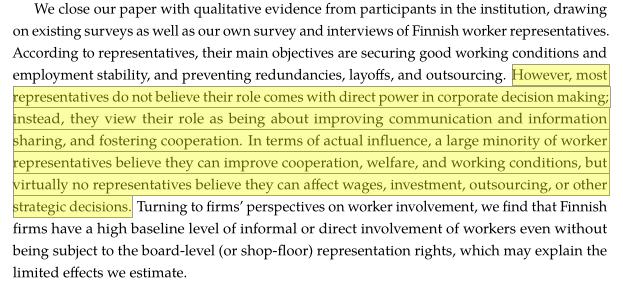
Finland in 1991 gave workers the right to elect representatives for 20% of the seats on the board/management body.
No negative effects for these firms, small positive effects. Seemed to "facilitate information sharing and cooperation rather than shifting power or rents to labor"
No negative effects for these firms, small positive effects. Seemed to "facilitate information sharing and cooperation rather than shifting power or rents to labor"
https://twitter.com/simon_jaeger/status/1360632147028148224
This is another must-read paper from @simon_jaeger and @Schoefer_B on shared governance!! You should definitely read the paper, including section 8 where the authors discuss implications.
A few brief thoughts on what I take away on this regarding shared governance reforms:
A few brief thoughts on what I take away on this regarding shared governance reforms:
1/ The right to worker representation introduced was around 20%, and often these representatives don't have formal voting rights (see excerpt from p.1 of the paper below).
It's great to see that this resulted in better information sharing and communication. It also seems ...
It's great to see that this resulted in better information sharing and communication. It also seems ...

... unlikely that this would have shifted power balances in management decisions a big a way to lead to substantial redistribution to workers. The survey the authors conducted confirms that the worker reps see their role as less about power than cooperation & communication 

& the authors discuss this explicitly in section 8, confirming that any effect on workers' power in the firms is probably limited -- it was a reform that promoted voice more than redistributing power. 

2/ The identification strategy necessarily compares firms affected vs not affected by the reform (with more than vs. less than 150 employees). The very thorough work shows pretty clearly there is not much difference in worker outcomes at firms with vs. w/o worker representation.
... But, it can't tell us whether there were any general equilibrium effects of having worker representation (i.e. that affected all firms, the policy process, or cultural/social norms around worker-management relations or cross-class relations)
So my key takeaways are:
- minority representation for workers in corp governance *didn't* cause any negative effects, and if anything improved some outcomes for firms & workers
- this seems to come through increased information flow, communication, and cooperation. good things!
- minority representation for workers in corp governance *didn't* cause any negative effects, and if anything improved some outcomes for firms & workers
- this seems to come through increased information flow, communication, and cooperation. good things!
- but to see substantial redistribution of power & influence within firms, the findings from this paper suggest that a relatively weak minority representation for workers on management or oversight boards wouldn't be enough
Anyway - go read the paper :D
/end
Anyway - go read the paper :D
/end
• • •
Missing some Tweet in this thread? You can try to
force a refresh













